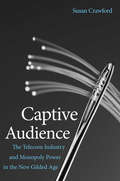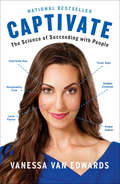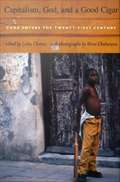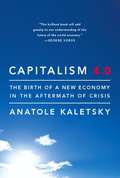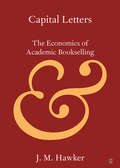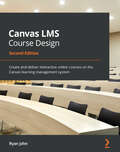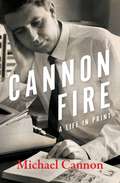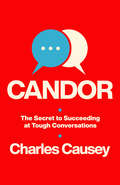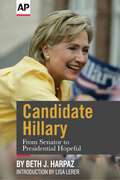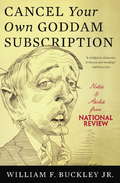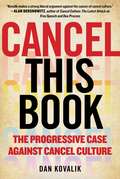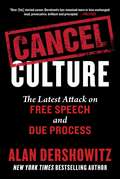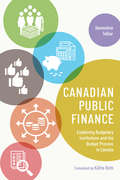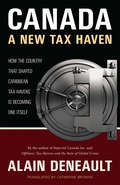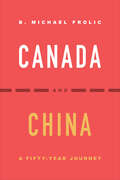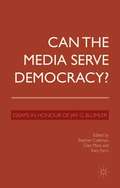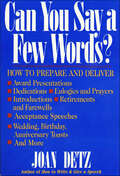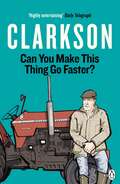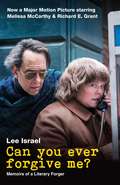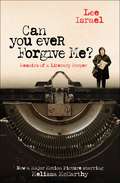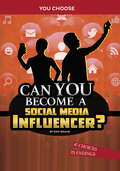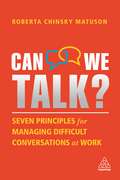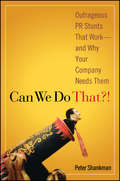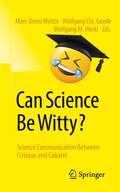- Table View
- List View
Captive Audience
by Susan P. CrawfordTen years ago, the United States stood at the forefront of the Internet revolution. With some of the fastest speeds and lowest prices in the world for high-speed Internet access, the nation was poised to be the global leader in the new knowledge-based economy. Today that global competitive advantage has all but vanished because of a series of government decisions and resulting monopolies that have allowed dozens of countries, including Japan and South Korea, to pass us in both speed and price of broadband. This steady slide backward not only deprives consumers of vital services needed in a competitive employment and business market--it also threatens the economic future of the nation.This important book by leading telecommunications policy expert Susan Crawford explores why Americans are now paying much more but getting much less when it comes to high-speed Internet access. Using the 2011 merger between Comcast and NBC Universal as a lens, Crawford examines how we have created the biggest monopoly since the breakup of Standard Oil a century ago. In the clearest terms, this book explores how telecommunications monopolies have affected the daily lives of consumers and America's global economic standing.
Captivate: The Science of Succeeding with People
by Vanessa Van EdwardsDo you feel awkward at networking events? Do you wonder what your date really thinks of you? Do you wish you could decode people? You need to learn the science of people. As a human behavior hacker, Vanessa Van Edwards created a research lab to study the hidden forces that drive us. And she&’s cracked the code. In Captivate, she shares shortcuts, systems, and secrets for taking charge of your interactions at work, at home, and in any social situation. These aren&’t the people skills you learned in school. This is the first comprehensive, science backed, real life manual on how to captivate anyone—and a completely new approach to building connections. Just like knowing the formulas to use in a chemistry lab, or the right programming language to build an app, Captivate provides simple ways to solve people problems. You&’ll learn, for example… · How to work a room: Every party, networking event, and social situation has a predictable map. Discover the sweet spot for making the most connections. · How to read faces: It&’s easier than you think to speed-read facial expressions and use them to predict people&’s emotions. · How to talk to anyone: Every conversation can be memorable—once you learn how certain words generate the pleasure hormone dopamine in listeners. When you understand the laws of human behavior, your influence, impact, and income will increase significantly. What&’s more, you will improve your interpersonal intelligence, make a killer first impression, and build rapport quickly and authentically in any situation—negotiations, interviews, parties, and pitches. You&’ll never interact the same way again.
Capitalism, God, and a Good Cigar: Cuba Enters the Twenty-First Century
by Lydia ChávezWhen the Soviet Union dissolved, so did the easy credit, cheap oil, and subsidies it had provided to Cuba. The bottom fell out of the Cuban economy, and many expected that Castro's revolution--the one that had inspired the Left throughout Latin America and elsewhere--would soon be gone as well. More than a decade later, the revolution lives on, albeit in a modified form. Following the collapse of Soviet communism, Castro legalized the dollar, opened the island to tourism, and allowed foreign investment, small-scale private enterprise, and remittances from exiles in Miami. Capitalism, God, and a Good Cigar describes what the changes implemented since the early 1990s have meant for ordinary Cubans: hotel workers, teachers, priests, factory workers, rap artists, writers, homemakers, and others. Based on reporting by journalists, writers, and documentary filmmakers since 2001, each of the essays collected here covers a particular dimension of contemporary Cuban society, revealing what it is like to have lived, for more than a decade, suspended between communism and capitalism. There are pieces on hip hop musicians, fiction writing and censorship, the state of ballet and the performing arts, and the role of computers and the Internet. Other essays address the shrinking yet still sizeable numbers of true believers in the promise of socialist revolution, the legendary cigar industry, the changing state of religion, the significance of the recent influx of money and people from Spain, and the tensions between recent Cuban emigrants and previous generations of exiles. Including more than seventy striking documentary photographs of Cuba's people, countryside, and city streets, this richly illustrated collection offers keen, even-handed insights into the abundant ironies of life in Cuba today. Contributors. Juliana Barbassa, Ana Campoy, Mimi Chakarova, Lydia Chvez, John Cot, Julian Foley, Angel Gonzlez, Megan Lardner, Ezequiel Minaya, Daniela Mohor, Archana Pyati, Alicia Roca, Olga R. Rodrguez, Bret Sigler, Annelise Wunderlich
Capitalism 4.0
by Anatole KaletskyIn early 2009, many economists, financiers, and media pundits were confidently predicting the end of the American-led capitalism that has shaped history and economics for the past 100 years. Yet the U.S. economic model, far from being discredited, may be strengthened by the financial crisis.In this provocative book, Anatole Kaletsky re-interprets the financial crisis as part of an evolutionary process inherent to the nature of democratic capitalism. Capitalism, he argues, is resilient. Its first form, Capitalism 1.0, was the classical laissez-faire capitalism that lasted from 1776 until 1930. Next was Capitalism 2.0, New Deal Keynesian social capitalism created in the 1930s and extinguished in the 1970s. Its last mutation, Reagan-Thatcher market fundamentalism, culminated in the financially-dominated globalization of the past decade and triggered the recession of 2009-10. The self-destruction of Capitalism 3.0 leaves the field open for the next phase of capitalism's evolution. Capitalism is likely to transform in the coming decades into something different both from the totally deregulated market fundamentalism of Reagan/Thatcher and from the Roosevelt-Kennedy era. This is Capitalism 4.0.
Capital Letters: The Economics of Academic Bookselling (Elements in Publishing and Book Culture)
by J. M. HawkerAcademic bookselling inhabits a landscape fundamentally impacted by legislative and political pressure, colonised by new textual forms and new publishing ventures, experiencing constant change. Capital Letters defines the academic bookshop, text, and market, examining change drivers in the UK, the USA and Asia. Drawing on current research, inclusive of commercial publishers and publishing interest groups, Capital Letters also includes quantitative and qualitative research data from academic booksellers. In evaluating the response of academic bookshops to the changing landscape, Capital Letters argues that academic booksellers can understand, shape, and lead a sustainable and equitable future for academic text within the marketplace.
Canvas LMS Course Design: Create and deliver interactive online courses on the Canvas learning management system, 2nd Edition
by Ryan JohnA simple, easy-to-follow guide to learning the advanced features and integrated services of Canvas for creating a transformative and personalized educational experienceKey FeaturesSimplify online and hybrid learning with Canvas with the help of this updated second editionDiscover best practices to engage with students as they complete assignments and receive feedback through the GradebookFollow clear directions to use Canvas tools and features for your educational requirementsBook DescriptionCanvas is an online learning management system (LMS) and one of the most powerful teaching tools that educational institutions worldwide have adopted thanks to its streamlined functionality, intuitive user interface, and robust features. This revised second edition of Canvas LMS Course Design will show you how to design, create, and teach engaging classes in online, hybrid, or fusion settings using the Canvas LMS. The book will guide you through the steps of setting up your Canvas account, creating activities and assignments, designing and customizing the course layout, and teaching your course. Whether you're using an institutional or Free-for-Teacher account, you'll be able to use Canvas for grading, feedback, and communication with and between students. As you progress, you'll learn how to integrate external apps and services with Canvas. Finally, the book features an exclusive section detailing how you can use Canvas' built-in resources as well as other resources to tackle challenges while working with the LMS. Throughout, this book will give you the technical knowledge you need to create unique learning experiences for students. By the end of this Canvas LMS Course Design, you'll be able to successfully teach online with the help of logical descriptions and step-by-step screenshots that clearly explain how to build a phenomenal course. What you will learnUnderstand online learning as a powerful and unique tool for student growthCreate, access, and personalize your user account and profile settings in CanvasGenerate, upload, and import course content for students to engage with as participants in your coursesDesign and sequence the content of your course to present information and activities with clarity and simplicityDiscover expert techniques for designing a curriculum and creating activitiesExplore Canvas features that meet your educational needs, such as online assessments and content deliveryWho this book is forThis book is for educators who want to use Canvas to deliver instructions in online, hybrid, or fusion teaching models. Whether you're new to online learning or a seasoned expert, you will be able to learn both the primary functions and the advanced features of Canvas with this book. As a minimum, beginner-level experience with online learning is required given the widespread implementation of distance learning due to the pandemic.
Cannon Fire: A Life in Print
by Michael CannonMichael Cannon is best known as the author of landmark and popular works of Australian history, including The Land Boomers (1966), and as the founding editor of Historical Records of Victoria. But Cannon, the child and grandchild of important figures in Australian independent journalism, developed a fascination with print media early in his life and had a long and colourful career in printing, publishing and editing books, newspapers and magazines. In Cannon Fire he brings to life many notable personalities with whom he worked, including Keith and Rupert Murdoch, and recreates the ink-stained, cigarette-smoke-filled and always well-lubricated worlds of publishing across Melbourne and Sydney in the second half of the twentieth century. More than this, Cannon's intimate account of a life that began in the 1920s fascinates as both a personal story of unusual courage in the face of challenge and heartache, and as a tale of times now passing from memory.
Candor: The Secret to Succeeding at Tough Conversations
by Charles CauseyOvercome the fear of speaking truth by learning to do it with love.In a society where sensitivities take precedence over honesty, it can often feel impossible to openly speak your mind. From managing conflict resolution in the workplace to navigating differences at home, many issues remain unaddressed and unresolved when you cannot speak clearly, candidly, and truthfully for fear of negative consequences.It&’s time to learn how to speak the truth in love. In Candor, you&’ll learn how truth and love together can unlock pathways to more effective leadership and relationships—even in a day and age when many remain silent for fear of speaking up. Discover how speaking with sensitive and effective candor can reshape your relationships and enable you to live a life of honesty and freedom.
Candor: The Secret to Succeeding at Tough Conversations
by Charles CauseyOvercome the fear of speaking truth by learning to do it with love.In a society where sensitivities take precedence over honesty, it can often feel impossible to openly speak your mind. From managing conflict resolution in the workplace to navigating differences at home, many issues remain unaddressed and unresolved when you cannot speak clearly, candidly, and truthfully for fear of negative consequences.It&’s time to learn how to speak the truth in love. In Candor, you&’ll learn how truth and love together can unlock pathways to more effective leadership and relationships—even in a day and age when many remain silent for fear of speaking up. Discover how speaking with sensitive and effective candor can reshape your relationships and enable you to live a life of honesty and freedom.
Candidate Hillary: From Senator to Presidential Hopeful
by Beth J. Harpaz The Associated PressHillary is up in the polls! Hillary is down in the polls! She&’s a feminist and women love her; she&’s an enabler and women hate her. She&’s brilliant and hardworking; she&’s entitled and untrustworthy. Sounds like Hillary Rodham Clinton&’s 2016 or even 2008 presidential campaign, right? Well, go back even farther to the year 2000 to discover how every one of those phrases was uttered during Hillary&’s very first campaign when she made history as the only first lady to ever run for office. That groundbreaking bid for U.S. Senate in New York made headlines around the world, coming as it did on the heels of her husband&’s scandalous affair with a White House intern. Reporter Beth J. Harpaz was there, covering this political whirlwind for The Associated Press, and her book, "Candidate Hillary," previously published as "The Girls in the Van," revisits every key moment of the race. This funny, fascinating account puts you in the press van that followed Hillary from Buffalo to Brooklyn as she fought a cast of familiar characters, including New York&’s pugnacious Mayor Rudy Giuliani. It&’s filled with all the successes and missteps, the kind that plagued the assumed front-runner&’s 2008 campaign for the Democratic presidential nomination, which instead went to a young Senator from Illinois named Barack Obama. Now, updated with new perspectives from the author and an introduction by National Politics Reporter Lisa Lerer, "Candidate Hillary" offers a window into Hillary&’s vulnerabilities, strengths and the inner workings of the Clinton machine, all told with authority, humor and the benefit of hindsight.
Cancel Your Own Goddam Subscription: Notes and Asides from National Review
by William F. Buckley Jr.National Review has always published letters from readers. In 1965 the magazine decided that certain letters merited different treatment, and William F. Buckley, the editor, began a column called "Notes & Asides” in which he personally replied to the most notable and outrageous correspondence. Culled from four decades of the column, Cancel Your Own Goddam Subscription includes exchanges with such well-known figures as Ronald Reagan, Richard Nixon, John Kenneth Galbraith, A. M. Rosenthal, Auberon Waugh, Arthur Schlesinger Jr. , and many others. There are also hilarious exchanges with ordinary readers, as well as letters from Buckley to various organizations and government agencies. Combative, brilliant, and uproariously funny, Cancel Your Own Goddam Subscription represents Buckley at his mischievous best.
Cancel This Book: The Progressive Case Against Cancel Culture
by Dan KovalikExamining a phenomenon that is sweeping the country, Cancel This Book shines the spotlight on the suppression of open and candid debate. The public shaming of individuals for actual or perceived offenses, often against emerging notions of proper racial and gender norms and relations, has become commonplace. In a number of cases, the shaming is accompanied by calls for the offending individuals to lose their jobs, positions, or other status. Frequently, those targeted for &“cancellation&” simply do not know the latest, ever-changing norms (often related to language) that they are accused of transgressing—or they have honest questions about issues that have been deemed off-limits for debate and discussion. Cancel This Book offers a unique perspective from Dan Kovalik, a progressive author who supports the ongoing movements for racial and gender equality and justice, but who is concerned about the prevalence of &“cancelling&” people, and especially of people who are well-intentioned and who are themselves allied with these movements. While many progressives believe that &“cancelling&” others is a form of activism and holding others accountable, Cancel This Book argues that &“cancellation&” is oftentimes counter-productive and destructive of the very values which the &“cancellers&” claim to support. And indeed, we now see instances in the workplace where employers are using this spirt of &“cancellation&” to pit employees against each other, to exert more control over the workforce and to undermine worker and labor solidarity. Kovalik observes that many progressives are quietly opposed to this &“Cancel Culture&” and to many instances of &“cancellation&” they witness, but they are afraid to air these concerns publicly lest they themselves be &“cancelled.&” The result is the suppression of open debate about important issues involving racial and gender matters, and even issues related to how to best confront the current COVID-19 pandemic. While people speak in whispers about their true feelings about such issues, critical debate and discussion is avoided, resentments build, and the movement for justice and equality is ultimately disserved.
Cancel Culture: The Latest Attack on Free Speech and Due Process
by Alan DershowitzIn Cancel Culture, Alan Dershowitz—New York Times bestselling author and one of America&’s most respected legal scholars—makes an argument for free speech, due process, and restraint against the often overeager impulse to completely cancel individuals and institutions at the ever-changing whims of social media-driven crowds. Alan Dershowitz has been called &“one of the most prominent and consistent defenders of civil liberties in America&” by Politico and &“the nation&’s most peripatetic civil liberties lawyer and one of its most distinguished defenders of individual rights&” by Newsweek. Yet he has come under intense criticism for his steadfast and consistent championing of those same principles, and his famed &“shoe‑on‑the‑other‑foot test,&” to those who have been &“cancelled&” for any number of faults, both real and imagined. Cancel Culture is a defense of due process, free speech, and even-handedness in the application of judgment. It makes the case for restraint and care in decisions about whom and what to cancel, boycott, deplatform, and bar from public life, and offers recommendations for when, why, and to what degree these steps may be appropriate, as long as objective, fair-minded criteria can be determined and met. While Dershowitz argues against the worst excesses of cancel culture—the rush to judgment and the devastating results it can have on those who may be innocent, the power of social media to effect punishment without a thorough examination of evidence, the idea that historical events can be viewed through the same lens as actions in the present day—he also acknowledges that its defenders ostensibly try to use it to create meaningful, positive change, and notes that cancelling may itself be a constitutionally protected form of free speech. In the end, Cancel Culture represents an icon in the defense of free speech and due process reckoning with the greatest challenge and threat to these rights since the rise of McCarthyism. It is essential reading for anyone interested in or concerned about cancel culture, its effects on our society, and its significance in a greater historical and political context.
Canadian Public Finance: Explaining Budgetary Institutions and the Budget Process in Canada
by Genevieve TellierBroken down into five sections explaining how public budgets are developed, Canadian Public Finance presents a comprehensive account of the budget process of the federal, provincial, and territorial governments. With a specific focus on the public policy process, Geneviève Tellier walks readers through the five steps involved in the budget process including agenda-setting, formulation, adoption, implementation, and evaluation. Taking a close look at how much influence key decision-makers actually have over the budget process, Tellier highlights recent events that reveal the political, social, and economic constraints that impact budgetary decisions. Tellier uses key words and textboxes at the end of each chapter to reflect on current issues and new developments in the world of public finance, such as gender-sensitive budgets, performance-based budgeting, and fiscal transparency.
Canada: A New Tax Haven
by Alain Deneault Catherine BrowneIn Canada: A New Tax Haven, Alain Deneault traces Canada's relationship with Commonwealth Caribbean nations back through the last half of the twentieth century, arguing that the involvement of Canadian financiers in establishing and maintaining Caribbean tax havens has predisposed Canada to become a tax haven itself - a metamorphosis well under way.Canada was linked to Caribbean nations long before they became tax havens. In the 1950s, an ex-governor of Canada's central bank attempted to establish a low taxation regime in Jamaica. In the 1960s, the transformation of the Bahamas into a tax haven characterized by impenetrable banking secrecy was shaped by a minister of finance who sat on the Royal Bank of Canada's board of directors. A Calgary lawyer and former Conservative Party heavyweight drew up the clauses that transformed the Cayman Islands into an opaque offshore jurisdiction. For years, Canadian politicians have debated annexing tax havens such as the Turks and Caicos Islands, making them part of Canadian territory. Canada has signed a free-trade agreement with Panama and is currently seeking a wider agreement with countries in CARICOM, the Caribbean economic community. And, notably, Canada currently shares its seat at the World Bank and the International Monetary Fund with a group of Caribbean tax havens.These exercises in fostering fiscal and banking leniency have predisposed Canada to become one of the most attractive tax havens to foreign interests. Not only does Canada offer one of the lowest corporate tax rates in the world, but a number of loopholes encourage companies to relocate to Canada as if it were Barbados or Bermuda.Canada: A New Tax Haven is an attempt to analyze the situation and address its implications for Canadians.
Canada and China: A Fifty-Year Journey
by B. Michael FrolicPresenting a thorough record of Canada’s diplomatic ties with China, Canada and China recounts ten stories regarding China policy decisions made by the Canadian government. These decisions describe key bilateral moves, beginning with Pierre Trudeau’s recognition of China in 1970 and ending fifty years later with his son Justin’s attempt to reset a struggling relationship with China. Rooted in archival research, extensive interviews, and the author’s experience as a policy observer, the book contributes to our understanding of how the Canada-China relationship has developed over time and how best to position Canada in future relations with China. While present-day relations with China are complicated, the book deliberately seeks to provide a balanced perspective by showing both the positive and the more challenging aspects of relations with China. Ultimately, Canada and China recommends ways to manage future relations with China, while also honouring the ties it developed over fifty years.
Can the Media Serve Democracy?
by Stephen Coleman Giles Moss Katy ParryThis landmark collection brings leading scholars in the field of political communication to debate one of the most important questions of our age: Can the media serve democracy? For the media to be democratic, they must enter into a positive relationship with their readers, viewers and listeners as citizens rather than consumers who buy things, audiences who gaze upon spectacles or isolated egos, obsessed with themselves. The media's first task is to remind people that they are inhabitants of a world in which they can make a difference. By enabling citizens to encounter and make sense of events, relationships and cultures of which they have no direct experience, the media constitute a public arena in which members of the public come together as more than passing strangers.
Can You Say a Few Words?: How To Prepare And Deliver A Speech For Any Special Occasion
by Joan Detz-Your alma mater asks you to say a few words at an upcoming fundraising dinner-You've won an employee award and will have to give a short acceptance speech at the ceremony-Your parents are celebrating their 50th anniversary, and you'd like to make a toast at their partyEveryone's counting on you to sound polished, to be prepared, to speak with savvy-in short, to give a speech that's as memorable as the occasion itself.Don't dread these invitations to speak. Instead, learn to prepare clear, concise, and engaging speeches that will live up to your audience's expectations and match the mood of the occasion.Award-winning corporate speechwriter Joan Detz offers solid advice for tackling this nerve-racking task-with pointers, tips, and trade secrets that will help you make the most of every speaking opportunity.Clearly written and fun to read, this invaluable guide provides all the practical advice and encouragement you need to deliver a winning speech.
Can You Make This Thing Go Faster?
by Jeremy ClarksonThe hilarious new collection of stories and observations from Jeremy Clarkson - setting our off-kilter world to rights with thigh-slapping wit once again.Who is that tractor-driving Gentleman Farmer?Has Jeremy turned into a horny-handed son of the soil?These and other perplexing questions may or may not be answered in the latest volume of Clarkson's utterly unbiased musings on life, the universe and everything in between (except cars - this isn't one of his four-wheel drive books).Inside you'll also discover why:· Bathing in crude oil isn't for everyone· People who go fishing hate their kids· Noise-cancelling headphones will never silence James May· The rambler who stole his marrow is in for itFull of fact-checked opinions and ideas so good they're no longer following the science but chasing it up a tree, Can You Make This Thing Go Faster? is one hundred per cent guaranteed Clarkson . . .Praise for Clarkson:'Brilliant . . . laugh-out-loud' Daily Telegraph'Outrageously funny . . . will have you in stitches' Time Out'Very funny . . . I cracked up laughing on the tube' Evening Standard
Can You Ever Forgive Me?: Memoirs of a Literary Forger
by Lee IsraelNow a major motion picture starring Melissa McCarthy—Lee Israel’s hilarious and shocking memoir of the astonishing caper she carried on for almost two years when she forged and sold more than three hundred letters by such literary notables as Dorothy Parker, Edna Ferber, Noel Coward, and many others.Before turning to her life of crime—running a one-woman forgery business out of a phone booth in a Greenwich Village bar and even dodging the FBI—Lee Israel had a legitimate career as an author of biographies. Her first book on Tallulah Bankhead was a New York Times bestseller, and her second, on the late journalist and reporter Dorothy Kilgallen, made a splash in the headlines. But by 1990, almost broke and desperate to hang onto her Upper West Side studio, Lee made a bold and irreversible career change: inspired by a letter she’d received once from Katharine Hepburn, and armed with her considerable skills as a researcher and celebrity biographer, she began to forge letters in the voices of literary greats. Between 1990 and 1991, she wrote more than three hundred letters in the voices of, among others, Dorothy Parker, Louise Brooks, Edna Ferber, Lillian Hellman, and Noel Coward—and sold the forgeries to memorabilia and autograph dealers. “Lee Israel is deft, funny, and eminently entertaining…[in her] gentle parable about the modern culture of fame, about those who worship it, those who strive for it, and those who trade in its relics” (The Associated Press). Exquisitely written, with reproductions of her marvelous forgeries, Can You Ever Forgive Me? is “a slender, sordid, and pretty damned fabulous book about her misadventures” (The New York Times Book Review).
Can You Ever Forgive Me?: Memoirs of a Literary Forger
by Lee IsraelBefore turning to the criminal life, running a onewoman forgery scam out of an Upper West Side studio shared with her tortoiseshell cat, and dodging the FBI, Lee Israel enjoyed a celebrated reputation as an author. When her writing career suddenly took a turn for the worse, she conceived of the astonishing literary scheme that fooled even many of the experts. Forging hundreds of letters from such collectible luminaries as Dorothy Parker, Noël Coward, and Lillian Hellman -- and recreating their autographs with a flourish -- Israel sold her "memorabilia" to dealers across the country, producing a collection of pitch-perfect imitations virtually indistinguishable from the voices of their real-life counterparts. Exquisitely written, with reproductions of her marvelous forgeries, Can You Ever Forgive Me? is Israel's delightful, hilarious memoir of a brilliant and audacious literary crime caper.
Can You Become a Social Media Influencer?: An Interactive Adventure (You Choose: Chasing Fame and Fortune)
by Eric BraunDo you want to make social media your microphone to the world? Maybe you're a trend-setter or a social justice leader. Now is your chance to set out a path to social media domination. Face real-life choices that will help you learn about marketing, messaging, and what it takes to make it as a social media star.
Can We Talk?: Seven Principles for Managing Difficult Conversations at Work
by Roberta Chinsky MatusonAre you avoiding an uncomfortable conversation at work? If you're an executive or a team leader, strengthening your organization's ability to have difficult conversations is necessary and worth the discomfort.The key to successful dialogue starts and ends with changing the conversation. Recognizing that it takes two people to engage in meaningful outcomes, Can We Talk? outlines what each contributor needs to do to achieve the best possible result. Using examples from everyday work situations, this book offers guidance on how to create the right conditions for a meaningful discussion. The author identifies the seven key principles that enable both parties to gain a deeper understanding of what the other person may be thinking and will help establish their point of view more clearly: confidence, clarity, compassion, curiosity, compromise, credibility, courage.Can We Talk? includes examples and advice from those who have been there and thrived, as well as lessons learned from conversation failures and example scripts of productive conversations. Readers will learn how to prepare, start and manage the potentially challenging exchange of words that typically occur at work, and come away with an understanding that for any conversation to take place, both parties must be engaged.
Can We Do That!
by Peter ShankmanThis fun and friendly book looks at real-life PR stunts that will blow your mind and inspire you to develop innovative and creative ways to get your company noticed. PR guru Peter Shankman chronicles the most ridiculous, outrageous, and possibly crazy PR stunts of all time-explaining why some work and others don't. This is a funny, insightful guide to winning the PR game.
Can Science Be Witty?: Science Communication Between Critique and Cabaret
by Marc-Denis Weitze Wolfgang M. Heckl Wolfgang Chr. Goede"Can science be funny?" takes a close look at an element of modern science communication that is as innovative as it is promising for the future: comedy!Readers are guided through vividly presented academic theory as well as exciting hands-on and best practice examples from renowned practitioners and cabaret artists:- What do sheep's cheese and car tires have in common?- Can laughter break down walls?- How does "Die Anstalt" work?- How does magic create knowledge?- Is there humor in museums?- When a Dalmatian comes to the cash register- Three steps to humor- Serving suggestion for the Holy Spirit- dictatorship of stupidity- And much more!But it's not all just funny. Comedy can also take away some of the biting sharpness of criticism, making it digestible, even palatable, for the addressees."Can Science Be Funny?" navigates between criticism and cabaret, tackling comedy in various guises from different perspectives.22 contributions show how the results of science, research and technology can be brought to the general public in new ways. In particular, they also demonstrate how humour can be used as a critical and questioning force - valuable for all types of communication and helpful so that they come across more shrewdly in the future.
